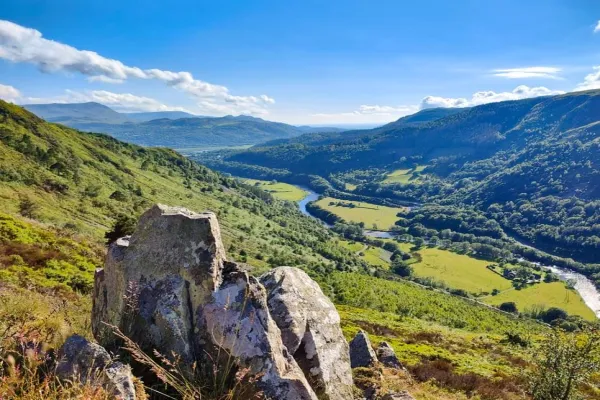Have you got your eye on a specific property, and want to find out more information about it?
Believe it or not, most details about the ownership of a house is available through the Land Registry.
Read on to find out more.
How to find out who owns a property
When you want to find out who owns a property, there are a few steps you can take.
The HM Land Registry holds information about house ownership across the entirety of the UK, known as the ‘Title Deeds’.
By searching this database, you will find the following information on most properties:
- Title Register – includes the price paid for the property/land, ownership information, right of way, and whether there is a mortgage on the house
- Title Summary – includes the title number, ownership information, whether it is leasehold or freehold, and sometimes the mortgage lender (if applicable)
- Title Plan – includes the location of the property, boundaries, and right of way
Until 2021, the Land Registry also included a ‘flood risk indicator’. This provided information on how vulnerable the area (not the specific property) is to flooding.
This data is no longer provided under the HM Land Registry, but you may be able to access this information through the government website by entering the postcode you’re interested in.
How to find out who owns land
To find out who owns a specific plot of land, follow the same steps as outlined in the section above.
As the name suggests, the Land Registry stores all this information about land (as well as properties) so you should search on there to get the details you need.
Does it cost money to search the Land Registry?
Yes. The UK government website provides details on the amount you need to pay, with this sum varying depending on what you’re looking for. Most searches are charged at £3 or £7 for an online application, and typically £7 when applying by post.
Under one of these two prices, you can search for things including:
- Official copy of an exempt information document
- Copy of a historical edition of a registered title
- Official search by mortgagee in respect of home rights
- Official search of the index of relating franchises and manors
These are just four of over a dozen different pieces of information that you can access.
To pay these fees, you can do so via Direct Debit, by writing a cheque, or by postal order.
Reasons a property might not be on the Land Registry
The Land Registry provides in-depth information about property transactions since 1990 – the year in which it became a legal requirement to register ownership.
If the house you are searching for has yet to complete a sale in the past three and a half decades, it may not appear on the Land Registry.
If you want to find out about a house that is not registered, you may need to take matters into your own hands.
For example, you could put a letter in the door of the house itself, and ask for a response.
Other ways you could achieve this include:
- Ask neighbours or adjoining landowners if they know who the owner is
- Ask in the local pub, post office or shop
- Search country or local authority records for clues
- Check adjoining registered properties – as they might refer to a deed or document which affected not only that registered title but also ‘other land’
- Look at your local electoral register
You will need to do your own investigation to find a definitive answer.
If the ownership is not listed on the Land Registry, it is unlikely to be on many other easily accessible official public documents, either.
Reasons you may want to find out who owns property or land
There are several reasons why you might want or need to find out who owns property or a specific plot of land.
A common reason is if you want to buy the house, but it is not currently listed on the market.
It may be a childhood home that you grew up in, and now want to move back into in your retirement.
Or maybe you have simply fallen in love with the aesthetic, and want to make the owner an offer.
Another explanation is that you want to find out how much this property would be worth – not so you can buy it, but if you are interested in another house in the local area (and want a point of reference).
Similarly, if the property you’re interested in has been listed on the market, you could speak to the owner to clarify precisely why it has been listed as a particular price.
Potential developments in the area may cause you to want to reach out to the house owner.
Perhaps there is a new development being proposed nearby, and you are signing a petition of local residents to object.
Or, you may be planning the developments yourself but need to get the sign-off of local homeowners who will be affected.
A fourth – and equally common – explanation is natural curiosity.
Maybe you live in the area and want to become friendly with the owners, or perhaps it is an empty plot of land which you are curious to learn how it will be used.
You could be the one ‘in the know’ with a little research.
Can I contact someone about buying their house if it’s not up for sale?
Yes, there is nothing wrong with reaching out to a homeowner yourself and enquiring about buying it – even if it is not up for sale.
You could knock on the door and introduce yourself, explain your interest in the property and state that you’d like to make an offer.
Or, you could put a short, personalised note through the letterbox, again stating your interest.
You should prepare before reaching out.
For example, if you are a chain-free cash buyer, the owner may be more receptive to your offer, and if you can get all the funds in-place beforehand, you may stand a better chance.
Be cautious about reaching out to more than one property at a time. After all, if two separate owners take you up on your offer, you then face the awkward task of letting one of them down.
Is it usually companies that own the plot of land?
In the UK, a lot of the land is owned by public companies and local authorities.
Private companies (investors) own a lot of land, too. However, this only accounts for some plots of land, and you will still find plenty across the UK owned by individuals.
So, in short, it is a mix of all the above.
















